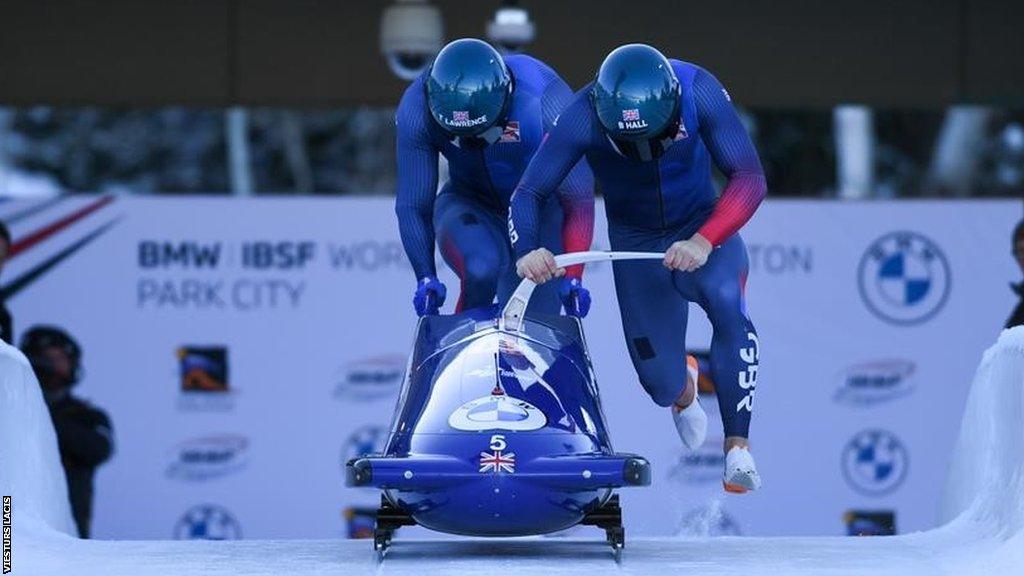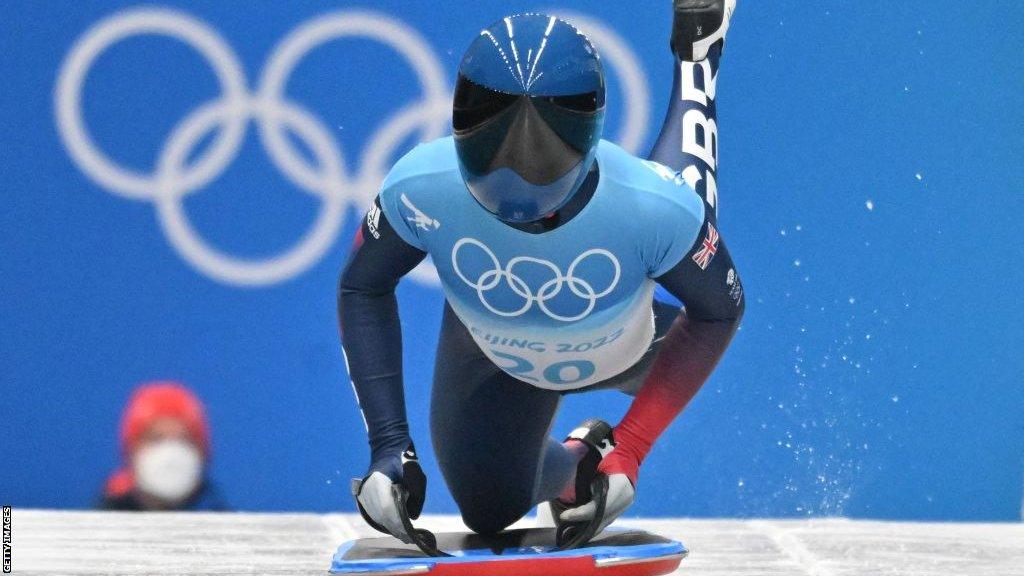British Bobsleigh & Skeleton Association chief Joanna Poulton resigned over 'mad' plans
- Published

British bobsleigh and skeleton athletes have won six medals at this season's two World Cup events
The chair of the British Bobsleigh and Skeleton Association resigned over "absolutely mad" plans by UK Sport to change how winter sports are run, the BBC has learned.
Proposals being considered by the funding agency would involve removing elite programmes from governing bodies and handing them over to a "single, purpose-built organisation".
In a concept paper seen by the BBC, it is argued this new organisation would provide a "greater return on investment and reduction in risk for UK Sport".
UK Sport said it has a "responsibility to continually seek new ways to best support Britain's athletes", adding it has and will "continue to consult with the relevant sports".
But Joanna Poulton recently resigned over what she says are "laughable" plans that would jeopardise the future viability of governing bodies.
She told BBC Sport: "I'm really disappointed to resign but I felt I had to as a matter of principle, in order that I could speak openly about UK Sport and what they are proposing.
"The idea that you can bring all the elite sports under one roof frankly seems to me to be laughable. It is naive to think that you can put all the high-performing athletes together and think that you are going to improve performance or have efficiencies and that is still what we don't understand."
It is understood that within the recent funding award for the bobsleigh and skeleton programmes for the Milan-Cortina Winter Olympics in 2024, BBSA (British Bobsleigh and Skeleton Association) were only guaranteed to be the delivery partner until October 2023.
Poulton said this has left the BBSA in the "awful" position of telling staff they cannot guarantee their employment beyond that date.
She said her fundamental issue with the proposal was that she could "not see how this proposal is going to benefit the athletes".
"There has been no justification, nothing in writing to us explaining why they think this new organisation is going to do a better job for the athletes, and for the money that is invested, than we can do for UK Sport via our expertise and understanding of how our two sports work," she said.

Team GB did not have any medal success at the last Winter Olympics in bobsleigh or skeleton
The concept paper for the organisation - provisionally called 'Sport Org' - says it would be a "custom-built environment, utilising individuals with a proven track record of delivering medals at Olympic and Paralympic Games".
It said the existing model for the delivery of WCPs (world class programmes) results in "duplication of effort and roles" and streamlining these to one organisation would bring "stability, efficiency and performance".
The paper adds that this concept is "initially modelled with the winter WCPs", and the BBC understands the two governing bodies with whom UK Sport are specifically engaging at this stage are BBSA and GB Snowsport.
The Sport Org consultation began in September 2021.
However, Poulton believes that the results at the Beijing 2022 Winter Olympics - with the only GB medals coming from curling - have impacted on UK Sport's desire to pursue this plan.
"I do think that's what they've done but I think it's incredibly short-sighted," she said.
"We told them where we spend most of our time. We spend a lot of our time on governance. We don't spend enough time on performance.
"It's naive to think that at every Olympic Games you are going to bring back medals, you just aren't. Every sport goes through cycles. You see that with swimming, cycling, rowing. What you have to look at is how long does it take to train an athlete for our two sports? It takes about eight years.
"That is two Olympic Games. One Olympic Games when the results weren't great - that is not a good enough reason to put in place a whole new system, and without consultation with us."
She said that she has concerns about what would happen to the talent pathway within sports and the ability of NGBs (national governing bodies) to attract sponsors without having access to elite athletes.
In recent weeks, British bobsleigh athletes have won three silver medals on the World Cup circuit, while skeleton athletes Marcus Wyatt, Matt Weston, Laura Deas and Brogan Crowley have all won World Cup medals.
In response to Poulton's comments, Sally Munday, CEO of UK Sport, said: "UK Sport remains committed to becoming an ever greater force in winter Olympic and Paralympic sport, as part of our mission to create the greatest decade of extraordinary sporting moments.
"As the leadership organisation for high-performance sport in the UK, we have a responsibility to continually seek new ways to best support Britain's athletes, to achieve their dreams and succeed on the world stage, while also maximising the impact of public funds.
"We are exploring whether funding to support British athletes in some winter sports could be optimised by aligning their performance operations, to enable athletes to continue to win and win well, whilst creating a thriving high-performance sport community. We have and will continue to consult with the relevant sports in the coming weeks and months."
A GB Snowsport spokesperson said: "We confirm that we are aware of discussions around a Sport Org and the need for greater clarity as the proposals become more transparent. We await with interest further information from UK Sport to assist in a full assessment of the impact such a plan could have for Britain's winter athletes, programmes and coaches."
The BBSA has not commented but is understood to be working with UK Sport to learn more about the proposals.